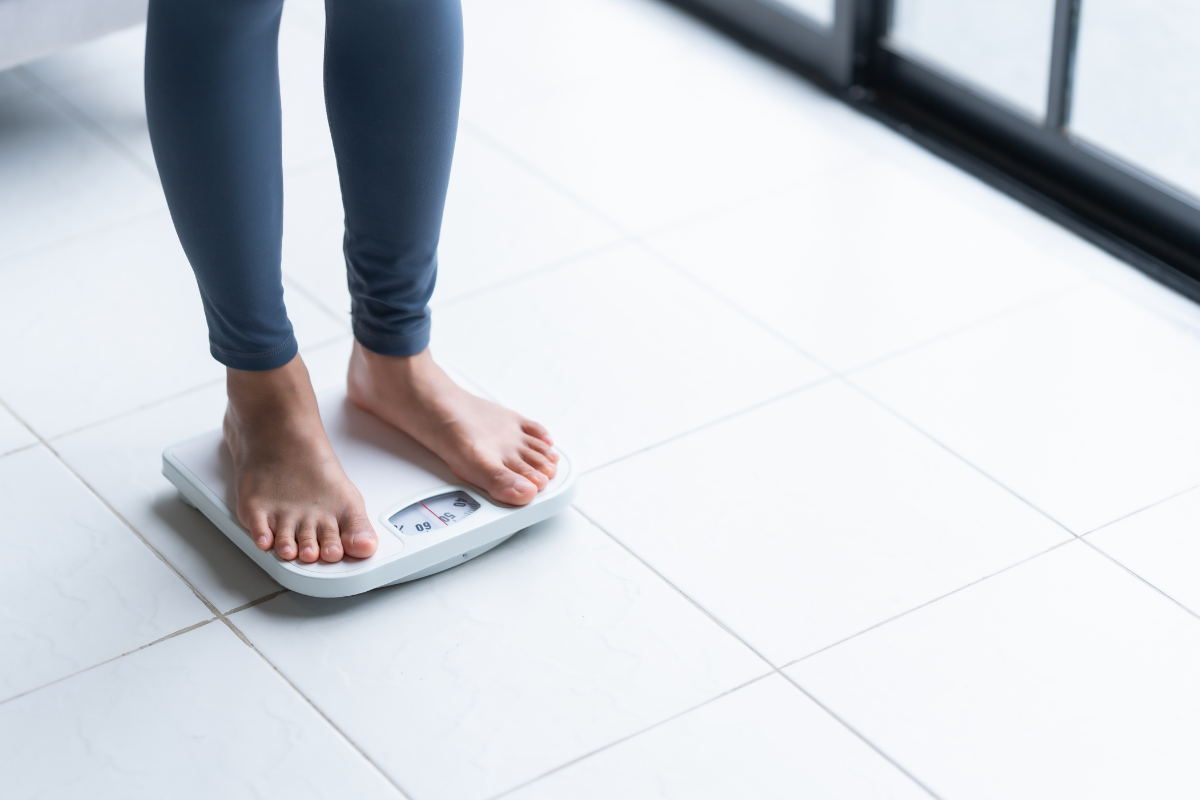
Why Am I Gaining So Much Weight During Perimenopause? Insights and Tips
Perimenopause is a pivotal stage in a woman’s life, marked by significant hormonal alterations that profoundly impact body composition and weight regulation. The question "Why am I gaining so much weight during perimenopause?" reflects a common concern experienced by many women navigating this phase. Unlike simple weight gain due to lifestyle factors, perimenopausal weight gain involves complex interplay between hormonal shifts, metabolism downturns, muscle loss, and neuroendocrine changes.
This is a natural phase marking the transition from reproductive years to menopause, characterised by fluctuating hormone levels that bring various physical and emotional changes - one of the most distressing being unexplained weight gain.
If you’re wondering why your weight seems to be increasing despite no major changes in your diet or activity level, this blog is for you!
The reasons behind perimenopausal weight gain are multifaceted, driven by hormonal imbalances, metabolic shifts, lifestyle factors, and psychological challenges. Understanding these causes is the first step toward reclaiming control and developing effective strategies tailored to your body’s changing needs.
Hormonal Imbalance and Fat Redistribution
During perimenopause, estrogen and progesterone levels fluctuate and gradually decline. Estrogen plays a key role in regulating metabolism, appetite, and fat distribution. Reduced estrogen slows down metabolic rate, lowering the number of calories your body burns at rest. Additionally, these hormonal changes shift fat storage patterns from the hips and thighs to the abdomen, leading to the notorious "perimenopausal belly." This visceral fat is particularly concerning as it surrounds vital organs such as the liver and pancreas and increases risks for insulin resistance, cardiovascular issues, and type 2 diabetes.
During perimenopause, the delicate balance of hormones in the body shifts dramatically as estrogen and progesterone levels fluctuate widely and gradually decline. Estrogen is particularly important for regulating metabolism, appetite control, and where fat is stored in the body. As estrogen levels fall, the body’s metabolic rate slows down, meaning fewer calories are burned at rest. This reduction can be subtle but over time causes a significant decrease in overall energy expenditure, creating the perfect environment for weight gain, even if you maintain your usual eating and exercise habits.
Aside from suppressing metabolism, declining estrogen leads to a redistribution of fat stores. Whereas premenopausal women tend to store fat around the hips and thighs (often referred to as a “pear shape”), perimenopausal hormonal changes cause an increased tendency to store fat centrally, around the abdomen. Unlike subcutaneous fat, visceral fat is metabolically active and secretes inflammatory substances that can disrupt insulin sensitivity and increase the risk of cardiovascular disease and type 2 diabetes.
Progesterone, another key hormone, also declines during perimenopause and has its own set of effects on fat storage and metabolism. Progesterone interacts with neurotransmitters in the brain that regulate mood and appetite and has a calming effect through GABA receptors. Lower progesterone levels can disrupt sleep and increase stress sensitivity, indirectly contributing to weight gain by impairing hunger cues and increasing cravings for high-calorie comfort foods. Fluctuating progesterone can also lead to water retention, bloating, and changes in body composition appearance.
Moreover, these hormonal fluctuations are unpredictable in perimenopause. Estrogen levels can spike erratically before falling, which confuses the body’s regulatory systems and makes weight management more challenging. These hormonal rollercoasters affect energy levels, motivation to exercise, and emotional wellbeing, all influencing weight outcomes.
This process is not simply a matter of “getting older” but reflects specific endocrine shifts unique to this life stage. Understanding this physiology helps frame weight gain in perimenopause not as a failure but as a normal response to changing hormones, underscoring the need for tailored health strategies during this time.
Changes in Insulin Sensitivity
As estrogen levels decline during perimenopause, many women experience a decrease in insulin sensitivity, meaning their body's cells respond less effectively to insulin, which is essential for regulating blood sugar levels. This reduced sensitivity, or insulin resistance, forces the pancreas to compensate by producing more insulin in an effort to maintain glucose balance in the blood.
High insulin levels encourage the storage of fat, particularly around the abdomen and waistline - an area often most noticeable to women experiencing perimenopausal weight gain. This visceral fat not only changes body shape but is hormonally active, secreting substances that increase inflammation and interfere with insulin function, creating a feedback loop that exacerbates insulin resistance even further. Intriguingly, this mechanism explains why some women gain significant abdominal fat despite maintaining their usual calorie intake and physical activity.
Estrogen itself normally enhances insulin sensitivity by promoting glucose uptake into muscle and fat cells and modulating inflammatory pathways that impact insulin action. Its decline disrupts these processes, impairing glucose metabolism. Additionally, cortisol levels can worsen insulin resistance and increase appetite for sugary and high-fat foods, further stimulating fat accumulation.
Compounding these hormonal shifts are age-related changes such as decreased muscle mass and mitochondrial function in muscle cells, which reduce the body’s ability to use glucose efficiently. This leads to higher blood sugar levels and a greater demand for insulin. Simultaneously, altered gut microbiome during perimenopause has been linked to impaired insulin sensitivity. Together, these factors create a metabolic environment that favours fat storage over fat burning.
Understanding these hormonal and metabolic disruptions behind changes in insulin sensitivity during perimenopause highlights why this phase can be particularly challenging for weight management. It also underscores the importance of early detection and targeted lifestyle support to mitigate insulin resistance and its associated weight gain. Our FREE digital download of Perimenopause Symptom Checker covers many of these factors.
Metabolic Slowdown and Loss of Lean Muscle
Ageing itself contributes to a gradual decline in basal metabolic rate (BMR), and this slowdown becomes much more pronounced during perimenopause. One of the biggest reasons for this shift is the natural loss of lean muscle mass that occurs with age — a process known as sarcopenia. Muscle tissue is metabolically active, meaning it burns significantly more calories at rest compared to fat tissue. When estrogen levels begin to fall, the body becomes less efficient at maintaining and rebuilding muscle, which accelerates the rate of muscle loss and further reduces the number of calories your body burns each day.
This decline doesn’t happen overnight; it often develops quietly over several years. Many women notice that they gain weight more easily than they used to, even when eating the same foods or following familiar routines. Without intentional intervention - such as incorporating regular strength training and consuming adequate protein - muscle loss continues, creating a cycle where the body burns less energy and stores more fat, particularly around the midsection. Even small reductions in lean muscle can have a significant impact on metabolic health, making it harder not only to lose weight, but also to maintain weight once it’s lost.
When lean mass decreases, your body becomes less responsive to blood sugar fluctuations, less efficient at burning fat, and more vulnerable to fatigue and reduced physical capacity. This metabolic shift is a key player in menopause-related weight changes, but it is also one of the most reversible aspects of midlife physiology.
With the right combination of resistance training, higher protein intake, and consistent movement, women can rebuild muscle, boost their metabolism, and regain the strength and vitality that supports long-term health and sustainable fat loss.
Emotional and Psychological Factors
Perimenopause can be an emotionally turbulent time, often marked not only by mood swings, anxiety, depression, and disrupted sleep, but also by a general sense of emotional unpredictability. Many women describe feeling “unmoored,” as if their inner world no longer matches their outer life.
These emotional shifts are rooted in changing hormone levels that directly influence neurotransmitters like serotonin and dopamine — the very chemicals that regulate mood, motivation, and emotional stability.
As stress increases, cortisol levels rise, and chronically elevated cortisol encourages the body to store fat centrally, particularly around the abdomen. This internal stress chemistry also heightens cravings for high-calorie comfort foods, especially those high in sugar and refined carbohydrates, which provide quick but temporary relief.
For many women, emotional eating becomes a natural coping mechanism, not out of weakness, but as a response to the hormonal and psychological strain their bodies are under. When meals or snacks become sources of soothing rather than nourishment, the cycle of weight gain accelerates, and feelings of guilt or frustration often follow — even though the behaviour is rooted in biology, not personal failure. Added to this, sleep disturbances common in perimenopause amplify emotional reactivity and make it harder to regulate appetite.
The combination of mood fluctuations, stress, disrupted sleep, and increased emotional sensitivity can make weight management feel harder than ever before.
Recognising these emotional and psychological influences is essential, because reducing menopause belly isn’t just about what you eat or how you move — it’s also about understanding your inner world, regulating stress, and offering yourself compassion as your body navigates profound change.
Lifestyle and Environmental Influences
Many women face increasing life demands during midlife such as career pressures, caregiving responsibilities, and social stressors. These factors can reduce time and motivation for regular physical activity and mindful eating. Sedentary habits, consumption of processed foods high in sugars and unhealthy fats, irregular meals, and poor sleep hygiene additionally contribute to a positive energy balance and fat storage.
Estrogen plays a crucial role in regulating metabolism, hunger, and fat distribution. Lower estrogen reduces the body’s ability to burn calories efficiently, leading to a slower basal metabolic rate. This means fewer calories are burned at rest, creating a propensity for weight gain even if calorie intake remains unchanged.
Simultaneously, muscle mass naturally declines with age and hormonal shifts, which further decreases metabolism. Since muscle burns more calories than fat, losing muscle mass means the body becomes less efficient at burning energy, contributing to fat accumulation.
Stress during perimenopause can also exacerbate weight gain. Elevated cortisol, the stress hormone, encourages abdominal fat storage and increases appetite, particularly for high-sugar and high-fat “comfort” foods. Emotional turmoil, mood swings, and sleep disturbances often associated with perimenopause can lead to emotional eating and disrupted energy balance.
Lifestyle factors compound these physiological changes. Sedentary habits, consumption of processed foods rich in sugar and unhealthy fats, irregular meal patterns, and poor sleep quality all promote weight gain. Psychological stressors such as anxiety and depression may reduce motivation for physical activity and healthy eating, further worsening the problem.
How Can Pure Goddess Help?
Now that we have taken a 'deep dive' into the many reasons why you may be experiencing weight gain during perimenopause and menopause, it’s important to highlight the many resources and products available to support you on your weight loss journey toward better health and renewed vitality.
Be sure to explore our other informative blogs such as How to Get Rid of Menopause Belly Naturally and How to Lose Weight in Perimenopause. These guides offer practical insights tailored to your changing body and hormonal needs.
Additionally, don’t forget to download our FREE Perimenopause Symptom Checker - a valuable digital tool designed to help you understand the symptoms you’re experiencing and empower you to take effective action.
At Pure Goddess, we have developed natural supplements with your unique needs in mind. Our brand new product, the Menopause Shake, is a thoughtfully formulated blend of plant protein, fiber, adaptogens, collagen, and essential vitamins and minerals. Together, these ingredients help maintain energy, support bone health, alleviate menopause symptoms, promote weight loss, and enhance overall wellbeing.
In addition, join thousands of Australian women benefiting from our Metabolism & Energy Superblend. This daily powdered blend is specifically designed to promote weight loss, boost calorie burning, and support healthy blood sugar levels. Backed by clinically supported ingredients, it helps reduce appetite, curb cravings, and maintain optimal thyroid and metabolic function.
These resources and products are here to guide and support you through your perimenopausal journey, empowering you to regain control of your health and feel your best every day.
Final Thoughts
Perimenopausal weight gain results from a combination of declining estrogen, insulin resistance, muscle loss, increased stress hormones, and lifestyle factors.
Recognising that these biological and emotional changes contribute to increased body fat - especially in the abdominal area, can help women approach weight gain with greater understanding and compassion. This awareness is the first step towards addressing it effectively with tailored strategies.










发表评论
此站点受 hCaptcha 保护,并且 hCaptcha 隐私政策和服务条款适用。